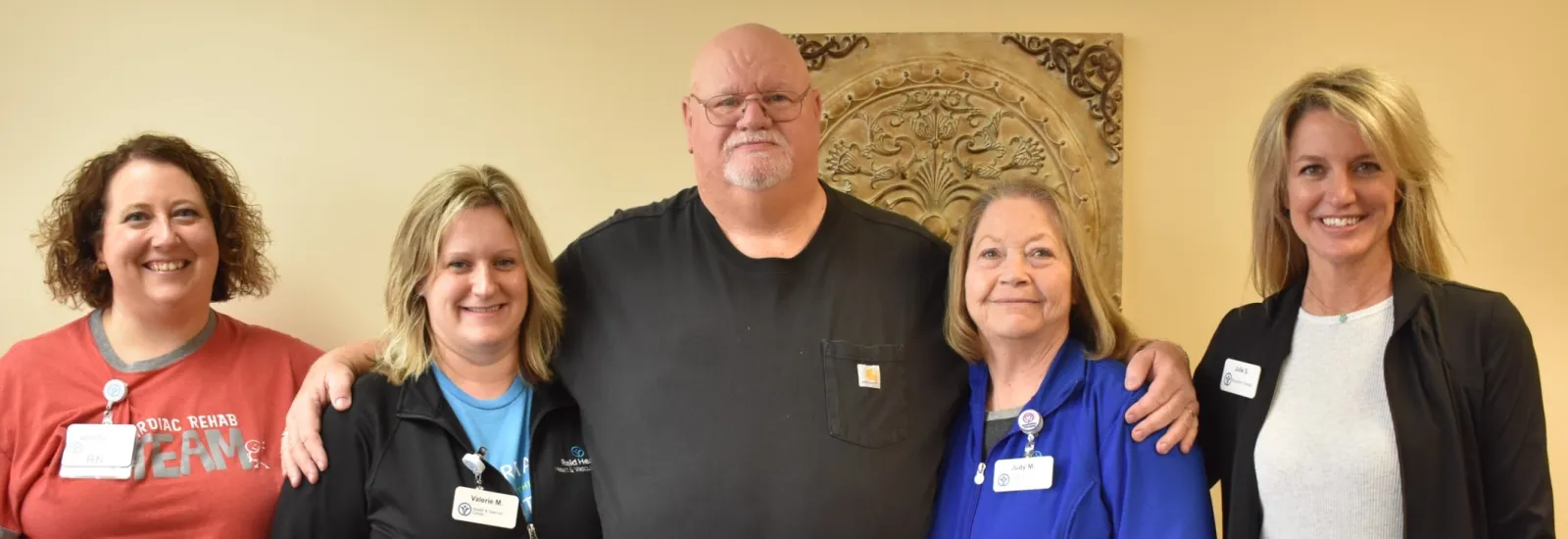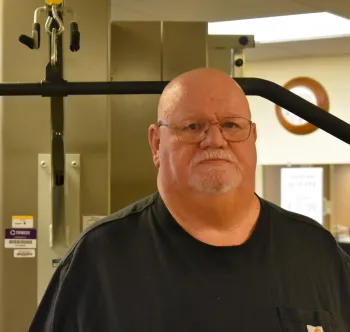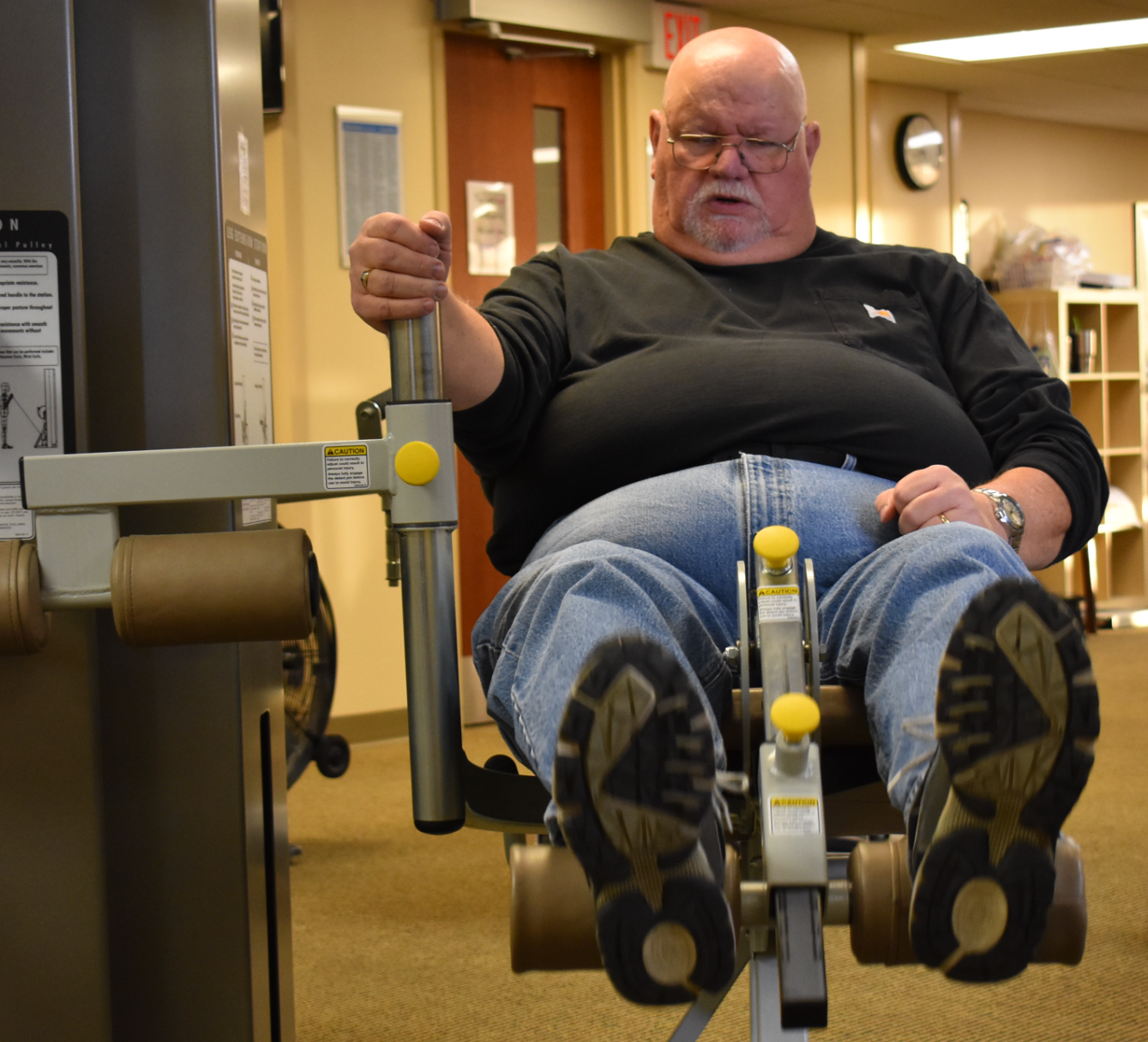
COVID-19 survivor: I wouldn’t be where I’m at without Pulmonary Rehab program

Above: Thanks to his work at Reid Health Cardiopulmonary Rehab, Fayette County resident Donald Steinard was able to eliminate his need for supplemental oxygen after having COVID-19. Top: Donald Steinard with the Reid Health Cardiopulmonary Rehab staff in Connersville.
It only takes
about six steps to walk 15 feet, and yet for months, Donald Steinard couldn't
cross that distance without the help of supplemental oxygen.
A bout with
COVID-19 had left his body so weak, he doubted he would be able to return to
his job or do many of the other things he had taken for granted before his
illness.
"I had heard so
many stories about COVID and the long-lasting effects, and I just thought, 'I'm
never going to be able to drive a truck again. I'm not even going to be able to
mow my own yard,'" the Fayette County resident said.
"That was one
of the hardest things -- sitting at the house and watching somebody else mow my
yard. I wanted to be able to take care of myself."
But after
months of work in Reid Health's Pulmonary Rehabilitation program in
Connersville, Steinard was told it was time to leave his oxygen tank aside and walk the
six steps from the scale used to weigh patients at the beginning of their
session to the chair where their vitals are checked.
"That was one
of the biggest steps I'd ever taken in my life," he said. "It was just 15 feet,
but that was the first time without any oxygen."
Steinard tested
positive for COVID a few days after he and his siblings had taken their dad out
for lunch. Only their father managed to avoid the virus.
The three
sisters had all been vaccinated, with two receiving booster shots as well. The
boosted sisters never showed symptoms despite testing positive. The other
sister lost her sense of taste and smell and managed her way through "a bad
cough."
Like Donald,
his brother was unvaccinated. He too had a bad cough and ended up at the emergency
room because of dehydration. But after a couple weeks, he was feeling better.
Things didn't
work out as well for Steinard. "I took the brunt of it," he said.
After testing
positive, he continued to feel worse and eventually decided to make the
12-minute drive from his home in Everton to the emergency room at Reid Health -
Connersville.
"By the time I
got to Connersville, I realized I had absolutely no business driving
whatsoever," Steinard said.
"I will always remember that day. I was hoping they could get me off the oxygen, but you always have that lingering doubt. After three or four sessions, reality set in. This is going to work. It's going to help." -- Donald Steinard
He was quickly
taken to Reid's main campus in Richmond where he would stay for 13 days, five
of them in intensive care. He spent his time in a recliner because he couldn't
breathe while laying down.
"A good bit of
that time, I was on 55 liters of oxygen," Steinard said. "I was tethered. I
couldn't get up. I couldn't do anything, so the nurses had to do everything for
me, which was a very humbling experience.
"I can't say
enough good about how I was treated. It was excellent care."
By the time he left
the hospital, Steinard still needed 12 liters of oxygen while moving and six at
rest. "If I went out, I had to drag two tanks around with me the whole time,"
he said.
Steinard was
referred to the Pulmonary Rehab program to regain his strength. The exact dates
for many of the milestones of his COVID experience don't immediately leap to
mind, but he has no trouble recalling when he went to his first rehab session -- Oct. 21, 2021.

"I will always
remember that day," Steinard said. "I was hoping they could get me off the
oxygen, but you always have that lingering doubt. After three or four sessions,
reality set in. This is going to work. It's going to help."
More than 30
rehab sessions later, Steinard no longer needed supplemental oxygen to get through his day,
only while sleeping. He decided to stick with the exercises, joining Pulmonary
Rehab's maintenance program and eventually eliminating his need for extra oxygen
altogether.
"One of the
best parts about being in here is the goals. Every time you reach a goal, they
reach that goal with you and celebrate with you," Steinard said.
"The patient
does all the work, but we encourage them. We're the motivator. We're there to
help them take that next step so they know they're not alone. When they walk
through the door, we're there," said Judy McQueen, a certified respiratory
therapist for Reid Health.
"Knowing he was
going back to work, it would send chills through us. There are so many patients
I've seen reach their goals. Some even have called me at home to say, 'Hey, I
danced at my granddaughter's wedding. That was my goal, and I was able to do
it.' To us, as therapists, it's just overwhelming what the program can do for
them."
Steinard is
grateful for the help he received from the staff, so much so he and his wife,
Cathy, continue to be regular participants in the maintenance program.
"I wouldn't be
where I'm at without going through Pulmonary Rehab," he said.
If you'd like to learn more about Reid Health's Pulmonary Rehab program or to register for services, go to reidhealth.org/hvpulmonary-rehabilitation or call (765) 983-3297.

